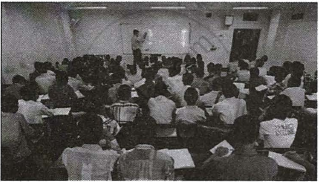Advertisements
Advertisements
Question
Find the value of k for which the system of linear equations has an infinite number of solutions:
kx + 3y = (2k + 1),
2(k + 1)x + 9y = (7k + 1).
Solution
The given system of equations:
kx + 3y = (2k + 1)
⇒ kx + 3y - (2k + 1) = 0 ….(i)
And, 2(k + 1)x + 9y = (7k + 1)
⇒ 2(k + 1)x + 9y - (7k + 1) = 0 …(ii)
These equations are of the following form:
`a_1x+b_1y+c_1 = 0, a_2x+b_2y+c_2 = 0`
where, `a_1 = k, b_1= 3, c_1= -(2k + 1) and a_2 = 2(k + 1), b_2 = 9, c_2= -(7k + 1)`
For an infinite number of solutions, we must have:
`(a_1)/(a_2) = (b_1)/(b_2) = (c_1)/(c_2)`
` i.e., k/(2(k+1)) = 3/9 = (−(2k+1))/(−(7k+1))`
`⇒k/(2(k+1)) = 1/3 = ((2k+1))/((7k+1))`
Now, we have the following three cases:
Case I:
`k/(2(k+1)) = 1/3`
⇒ 2(k + 1) = 3k
⇒ 2k + 2 = 3k
⇒ k = 2
Case II:
`1/3 = ((2k+1))/((7k+1))`
⇒ (7k + 1) = 6k + 3
⇒ k = 2
Case III:
`k/(2(k+1)) = ((2k+1))/((7k+1))`
⇒ k(7k + 1) = (2k + 1) × 2(k + 1)
`⇒ 7k^2 + k = (2k + 1) (2k + 2)`
`⇒ 7k^2 + k = 4k^2 + 4k + 2k + 2`
`⇒ 3k^2 – 5k – 2 = 0`
`⇒ 3k^2 – 6k + k – 2 = 0`
⇒ 3k(k – 2) + 1(k – 2) = 0
⇒ (3k + 1) (k – 2) = 0
`⇒ k = 2 or k = (−1)/3`
Hence, the given system of equations has an infinite number of solutions when k is equal to 2.
APPEARS IN
RELATED QUESTIONS
Find the value of k for which the following system of equations has a unique solution:
4x + ky + 8 = 0
2x + 2y + 2 = 0
Solve for x and y:
2x - `(3y)/4 = 3 ,5x = 2y + 7`
Find the value of k for which the system of equations has a unique solution:
kx + 3y = (k – 3),
12x + ky = k
The sum of two numbers is 137 and their differences are 43. Find the numbers.
The sum of the numerator and denominator of a fraction is 4 more than twice the numerator. If the numerator and denominator are increased by 3. They are in the ratio of 2: 3. Determine the fraction.
Write the number of solutions of the following pair of linear equations:
x + 3y – 4 = 0, 2x + 6y – 7 = 0.
Find the value of k for which the system of equations 3x + 5y = 0 and kx + 10y = 0 has infinite nonzero solutions.
Solve for x and y: `3/(x+y) + 2/(x−y) = 2, 9/(x+y) – 4/(x−y) = 1`
Find the value of k for which the following pair of linear equations has infinitely many solutions.
2x + 3y = 7, (k +1) x+ (2k -1) y = 4k + 1
Read the following passage:
|
A coaching institute of Mathematics conducts classes in two batches I and II and fees for rich and poor children are different. In batch I, there are 20 poor and 5 rich children, whereas in batch II, there are 5 poor and 25 rich children. The total monthly collection of fees from batch I is ₹9,000 and from batch II is ₹26,000. Assume that each poor child pays ₹x per month and each rich child pays ₹y per month.
|
Based on the above information, answer the following questions:
- Represent the information given above in terms of x and y.
- Find the monthly fee paid by a poor child.
OR
Find the difference in the monthly fee paid by a poor child and a rich child. - If there are 10 poor and 20 rich children in batch II, what is the total monthly collection of fees from batch II?

